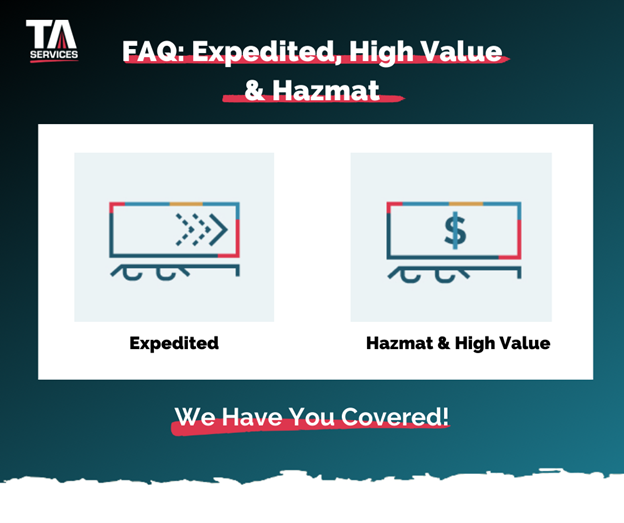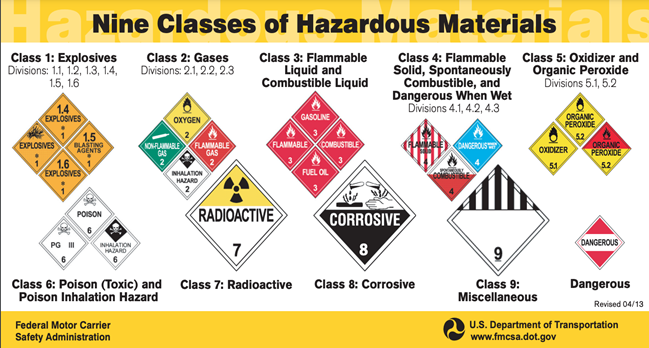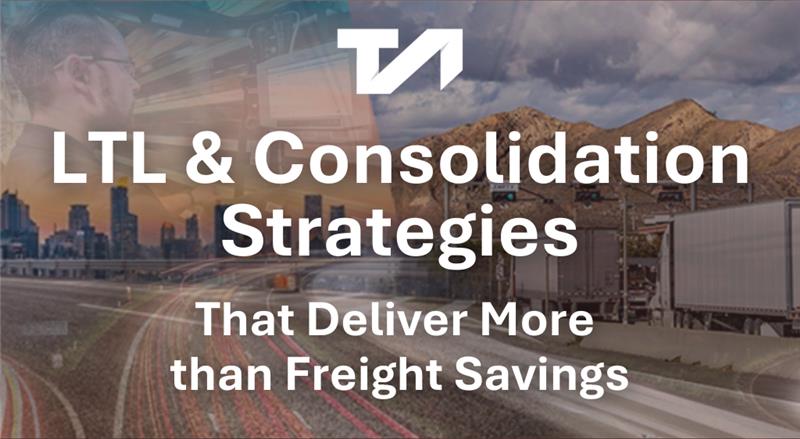Mar 22, 2022
Everything You Need to Know about Expedited Shipping, High-Value Cargo & Hazmat

In the most recent installment of our specialty freight series, we covered temperature controlled and heavy haul shipping. And before that, we answered your questions about less-than-truckload and extreme length. Today, we’ll be diving into the ins and outs of expedited shipping as well as high-value cargo and hazardous materials.
What you should know about expedited shipping
What is expedited shipping?
Simply put, expedited shipping is a faster method of shipping your freight than the standard timeline.
How much faster is it?
The exact timeline can vary, so it is important to set expectations with your carrier for each shipment. As an example, a standard shipment that would typically take five days to arrive at a fulfillment center may shorten to three days because a solo driver can usually run 500 miles per day, while team drivers can run 1,000 miles per day.
What methods are used for expedited shipping?
People often associate expedited shipping with air freight, but it can sometimes be faster and more cost-effective to ship via truckload. When it comes to ground shipping, expedited shipments typically make few or no stops along the way. But the Federal Motor Carrier Safety Administration (FMCSA) limits how long a driver can be on-duty and driving. So, using team drivers—two drivers who work in shifts to drive the truck—is a safe option that allows your freight to keep moving.
When should you use expedited shipping?
If you want to shorten your delivery time, it will cost extra. Having team drivers means paying two separate drivers to move your freight. For that reason, it doesn’t always make sense to choose expedited shipping for your needs. It’s important to look at the individual shipment and evaluate your supply chain’s priorities. When shipping high-priority items with vital timelines to meet, you may decide that the extra cost is worth it.
What to keep in mind next time you consider expedited shipping:
● Fast shipping doesn’t need to mean air freight. You can get expedited shipping via truckload shipping services.
● Remember that faster shipping means added costs.
● Evaluate your priorities. If you’re on a strict timeline and delivery windows are critical, the additional costs may be worth it.
The facts about high-value cargo and hazardous materials
What constitutes high-value cargo?
Cargo insurance amounts vary by service provider, but the majority of drivers carry $100k in cargo insurance. TA Services considers a shipment which has a cargo value higher than $100k to be high value.
What added protections are in place?
Cargo that is considered high value requires additional security and care. Carriers that have more than $100k in cargo insurance are prioritized above those with only $100k for high value shipments. TA Services partners with knowledgeable insurance providers who specialize in providing ad hoc coverage for high value loads, eliminating the gap between carrier coverage and cargo value. Additionally, tracking services are required for high value shipments to provide location visibility during transit.
What are hazardous materials?
Hazardous materials can be anything that poses a threat to the public or the environment when not handled properly.
The Federal Motor Carrier Safety Administration (FMCSA) groups hazardous materials into nine classes: explosives; gases; flammable liquid and combustible liquid; flammable solid, spontaneously combustible, and dangerous when wet; oxidizer and organic peroxide; poison (toxic) and poison inhalation hazard; radioactive; corrosive; and miscellaneous.

Source: Federal Motor Carrier Safety Administration
What are the requirements to ship hazardous materials?
Because of the dangers that can come from improperly handling hazardous materials, extra precautions must be taken for hazmat freight.
● The chemical manufacturer, distributor, or importer is required to provide a Safety Data Sheet (SDS) to any worker who will be handling the hazardous materials.
● Carriers may require you to provide additional shipping papers before they will transport hazardous materials.
● The FMCSA requires carriers to obtain a Hazardous Materials Safety Permit before transporting hazardous materials.
What to keep in mind next time you are shipping high-value cargo or hazardous materials:
● Plan ahead. Give yourself time to account for the added steps and precautions that are necessary for these types of shipments.
● Protect your business. If the proper paperwork and permits are not in place when shipping hazardous materials, you and your carrier could be subject to legal action or fees.
● Find a trusted partner. Due to the specialized nature of this freight, make sure you’re working with a knowledgeable partner who can guide you through the process.
At TA Services, we have 35 years of experience helping shippers like you manage everything that goes into a strategic and efficient transportation program, including expedited shipping, high-value cargo, and hazardous materials. We’re a trusted third-party logistics (3PL) provider making a difference in the supply chains of business owners throughout North America. Our areas of expertise include multimodal freight brokerage, warehousing & fulfillment, managed transportation, and cross-border logistics. When it comes to freight, TA has your back.
Get in touch with TA Services for a quote on your next freight shipment.



